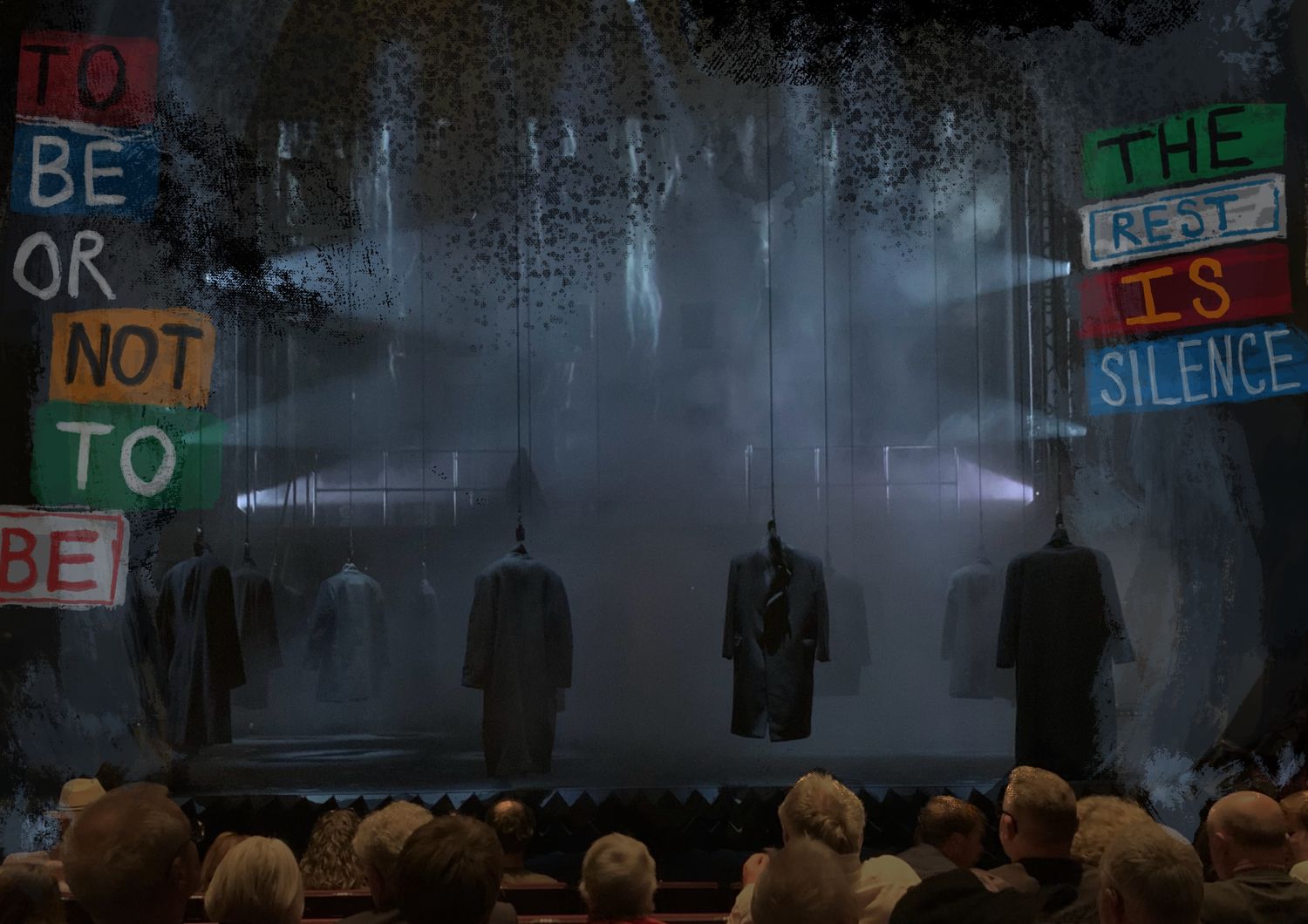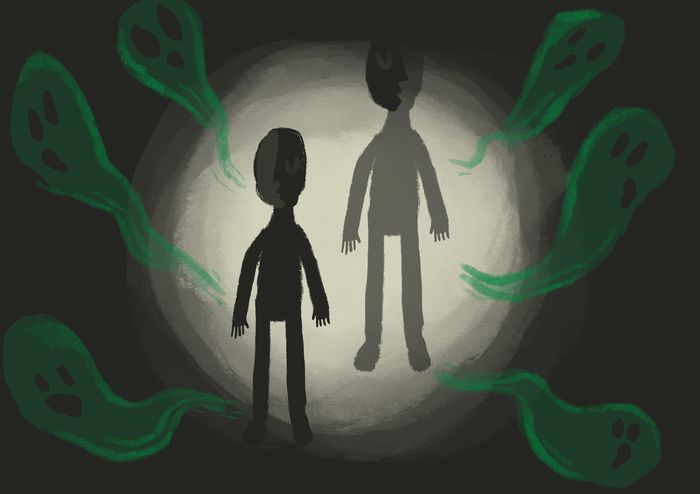All theatregoers have shared the same, awkward moonlit moment as the crowd spools out of the theatre doors after the performance. Little pockets of conversation begin to bubble into comments, critiques: “I fell asleep in the first half,” or “Claudius was a bit too angular.” “What was all that stuff about with the pearl?”
It’s a moment I despise, simply because it terrifies me: affecting expertise and sharing a few astute criticisms (condensed into well-worded aphorisms) on the choice of actor, the mapping of scenes, lighting, and costume. It’s pretty alien to put all that you just witnessed across a few hours of performance into a few words.
I did fall asleep in the first half. I did think Claudius was too sharp, too angular, too demonstrative. As an English student who had never read, watched, or had Hamlet extolled upon me, the pearl was completely lost on me. And this all has to do with the music.
Which was phenomenal.
I could listen to the scorning lyrics and grungy, yowling guitars of Radiohead’s Hail to the Thief it for years on end. It was my first Radiohead album on vinyl: an album that I hold close, and was feverishly excited to hear live, and no less, over some high-brow theatre. I was not disappointed: this listening experience was unparalleled.
Taking my highly overpriced seat in the stalls, the bass has already begun to radiate through the theatre floor. Imprisoned in a cube of glass at the back of the stage is the drummer, who thunders out the crashing rhythms of ‘2 + 2 = 5’ and ‘Myxomatosis’: flanked by the bassist and two guitars, I’m floored in my seat by this wall of sound. The enraged guitars, malignant bass and the album’s overall sounds of pain and anger all meet in the ear in some intermixture of pleasure that threatens to puncture the eardrums. It’s not Radiohead behind the glass, but with my eyes closed, it may as well could be. Two tall, slender, microphone-bearing figures emerge halfway up the back wall of the stage. Their voices are ephemeral, wounded, and cut across the mess of the early-noughties rock that spirals out beneath them. The singing on tracks like ‘I Will’ and ‘We Suck Young Blood’ raises one icy, hang-nailed finger that threatens to touch your very heart.
“Imprisoned in a cube of glass at the back of the stage is the drummer…flanked by the bassist and two guitars”
Characters break into song too – Ophelia’s madness-stricken rendition of ‘Sail to the Moon’ is probably the most poignant moment in the entirety of the play.
Which leads on to performance.
Condensing the near four-hour runtime of Shakespeare’s Hamlet into a frenetic one-hour-forty is no easy feat. Concurrently, however, it does smack of a whistle-stop guide to Hamlet, and not a great one at that.
As my first time experiencing Shakespeare’s Hamlet in any form, the details and characteristic Shakespearean witticisms are lost on me. More importantly, I’m ultimately confronted with the fact that, as Hamlet dies onstage in a palsy of blood and tears, I don’t particularly care. Certainly, many tragedies aim to achieve such a nihilistic, emotionally numbing response for their audience. Here, it feels like happenstance.
You simply don’t have the time to get to know the character you’re watching die onstage. The sheer musical power that overawes the entire theatre dwarfs Hamlet himself to a strutting actor, his lines drowned in reverb. He’s essentially an onstage stranger.
The deal this production offers is being short-changed on verse lines in exchange for lyrics and dance. I, personally, loved the dance set-pieces: the choreography is masterful and very ‘Hamlet’ – or what I considered ‘Hamlet’ to be. Think Michael Jackson’s Thriller meets professionally trained contemporary dance troupe. Repeatedly, from a few shuffled steps, Hamlet and Ophelia quickly stagger into gliding strides across the stage, darting in staccato and jagged directions that I didn’t know the human body could.
Ultimately, however, the music and dance only rarely accentuate the script, speech, or performance: they predominantly replace it. We lose Hamlet as a person and his strange, freakish comic edge. The wow-factor of song and dance becomes a replacement for nuanced Shakespearean acting. Claudius is an oily, histrionic caricature of evil that I can almost imagine Yorke envisioning himself.
“A high-speed, adrenalized shot of Shakespeare, delivered intravenously, straight to the nervous system”
Horatio, as a best friend, is empty of all significance until his final soliloquy is chosen to end the play. Hamlet’s “The rest is silence” are words that ring out – in silence: the only silence of the entire play. The guitars are off, the drummer with sticks in his lap.
Horatio’s crushingly denigrates the privileged, homicidal royalty with speech that resounds and dances in the pure music of Shakespeare’s verse. Horatio almost whispers “Now cracks a noble heart”: it is one of the few moments where performances shine.
My heart, however, confronted with a scene stacked with blood and bodies, remains intact. It is up until this point that the audience has not had one moment of stillness. The action has been non-stop and breathless, but equally occasionally airless, and empty. A high-speed, adrenalized shot of Shakespeare, delivered intravenously, straight to the nervous system through trembling eardrums and wide, devouring eyes. My heart breaks in Horatio’s fashion only knowing it could’ve been more.
If you go wanting Shakespeare’s Hamlet, you’re never going to get it. You’re given a performance that is an experience: an intensified, theatrical punch to the jaw, a paroxysm of pain and human suffering extolled onstage transmuted into expensive high-brow aesthetic pleasure. It’s a performance that defies expectation – that redefines the theatrical experience and could signpost the future of theatre – but it’s also a performance that fails to recognise and realise the power of silence and the music of verse.


